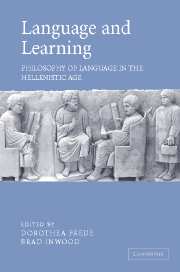Book contents
- Frontmatter
- Contents
- List of contributors
- Preface
- List of abbreviations
- Introduction
- 1 The Stoics on the origin of language and the foundations of etymology
- 2 Stoic linguistics, Plato's Cratylus, and Augustine's De dialectica
- 3 Epicurus and his predecessors on the origin of language
- 4 Lucretius on what language is not
- 5 Communicating Cynicism: Diogenes' gangsta rap
- 6 Common sense: concepts, definition and meaning in and out of the Stoa
- 7 Varro's anti-analogist
- 8 The Stoics on fallacies of equivocation
- 9 What is a disjunction?
- 10 Theories of language in the Hellenistic age and in the twelfth and thirteenth centuries
- References
- Index nominum et rerum
- Index locorum
3 - Epicurus and his predecessors on the origin of language
Published online by Cambridge University Press: 23 November 2009
- Frontmatter
- Contents
- List of contributors
- Preface
- List of abbreviations
- Introduction
- 1 The Stoics on the origin of language and the foundations of etymology
- 2 Stoic linguistics, Plato's Cratylus, and Augustine's De dialectica
- 3 Epicurus and his predecessors on the origin of language
- 4 Lucretius on what language is not
- 5 Communicating Cynicism: Diogenes' gangsta rap
- 6 Common sense: concepts, definition and meaning in and out of the Stoa
- 7 Varro's anti-analogist
- 8 The Stoics on fallacies of equivocation
- 9 What is a disjunction?
- 10 Theories of language in the Hellenistic age and in the twelfth and thirteenth centuries
- References
- Index nominum et rerum
- Index locorum
Summary
Epicurus' theory of the origin of language has been investigated many times, both in the context of his general theory of the origin of culture and in its own right. Among the various aspects of his theory that have attracted attention, the epistemological has played the most important role. What I try to provide here is not a complete account of the successes and limitations of previous studies, but an outline of Epicurus' theory about the development of language as it can be reconstructed from his own writings and from other relevant texts. In trying to elucidate the details, I will concentrate on some which are controversial and others which have gone altogether unnoticed by scholars. It is, of course, possible that some of the texts I shall use to throw light on the less clear aspects of Epicurus' theory may reflect nothing more direct than the influence of Epicurean ideas. I hope I shall manage to use such evidence with suitable caution. As the title of this chapter suggests, my subject includes the relation of Epicurus to his predecessors. I will discuss this mainly from the point of view just mentioned, by asking what is known of the stages of development of human language discerned by thinkers before Epicurus.
Information
- Type
- Chapter
- Information
- Language and LearningPhilosophy of Language in the Hellenistic Age, pp. 56 - 100Publisher: Cambridge University PressPrint publication year: 2005
Accessibility standard: Unknown
Why this information is here
This section outlines the accessibility features of this content - including support for screen readers, full keyboard navigation and high-contrast display options. This may not be relevant for you.Accessibility Information
- 43
- Cited by
